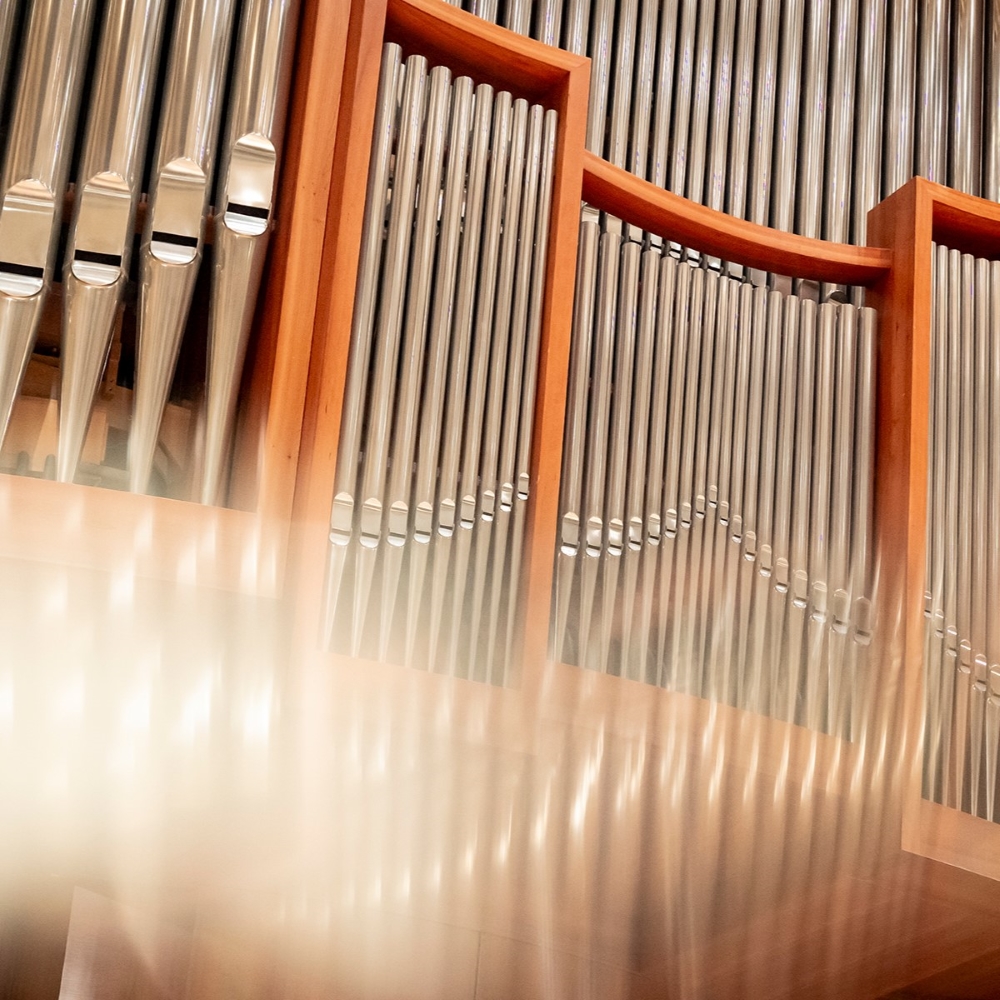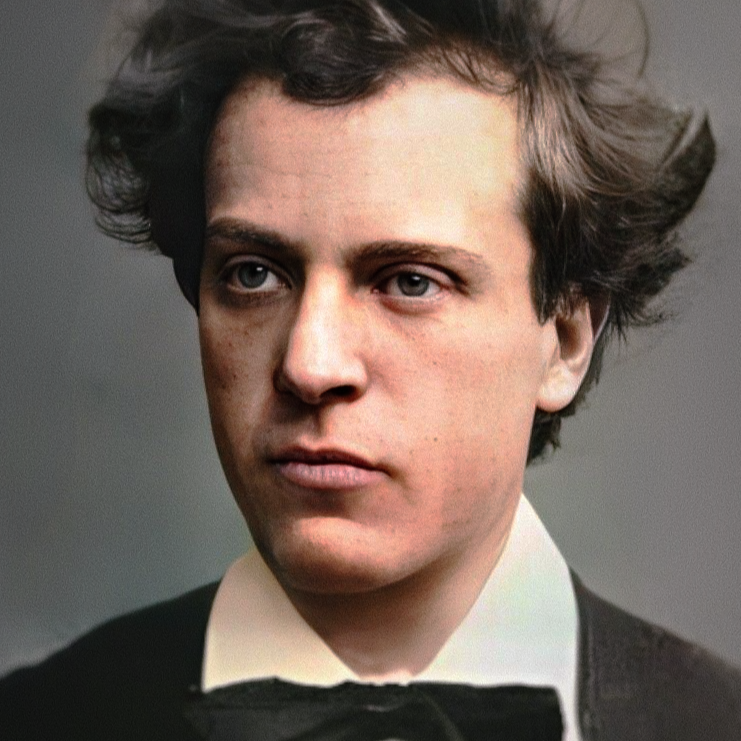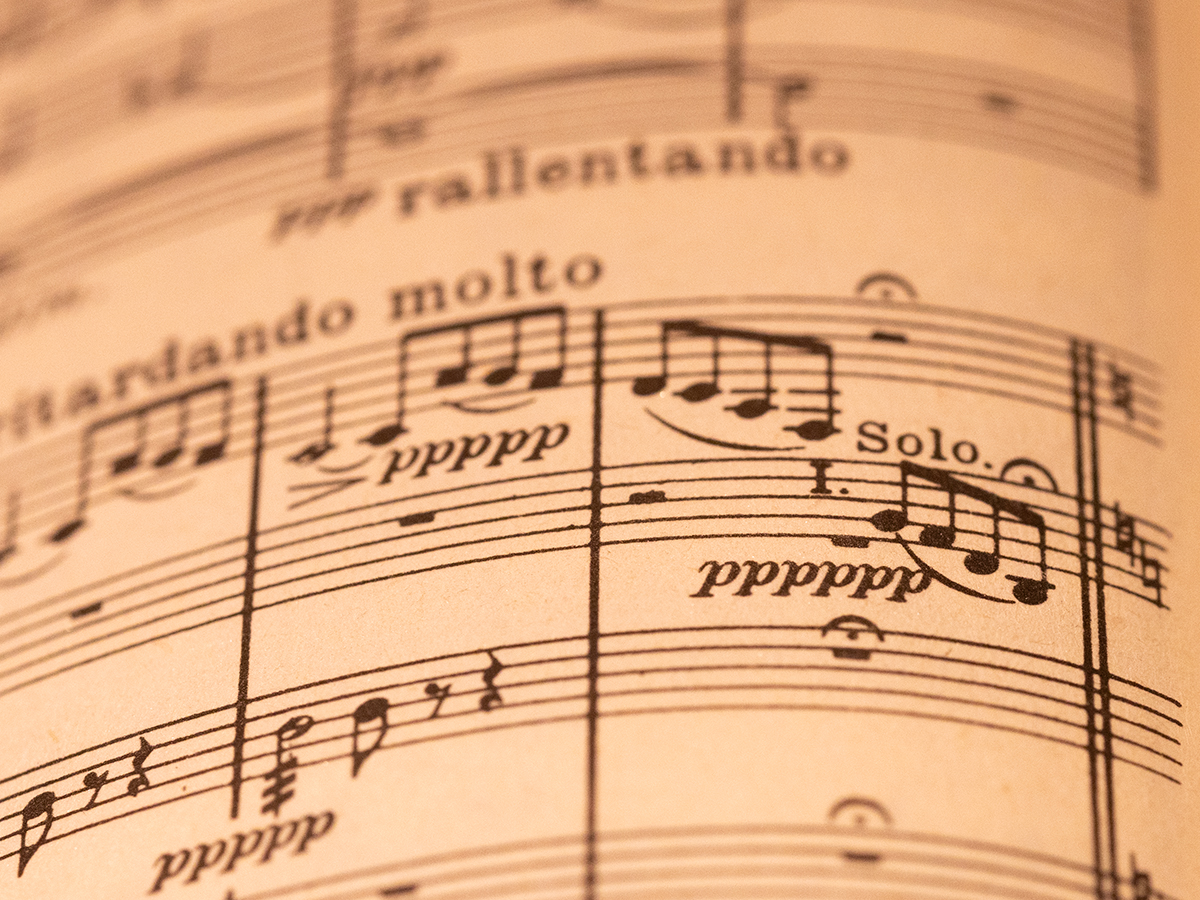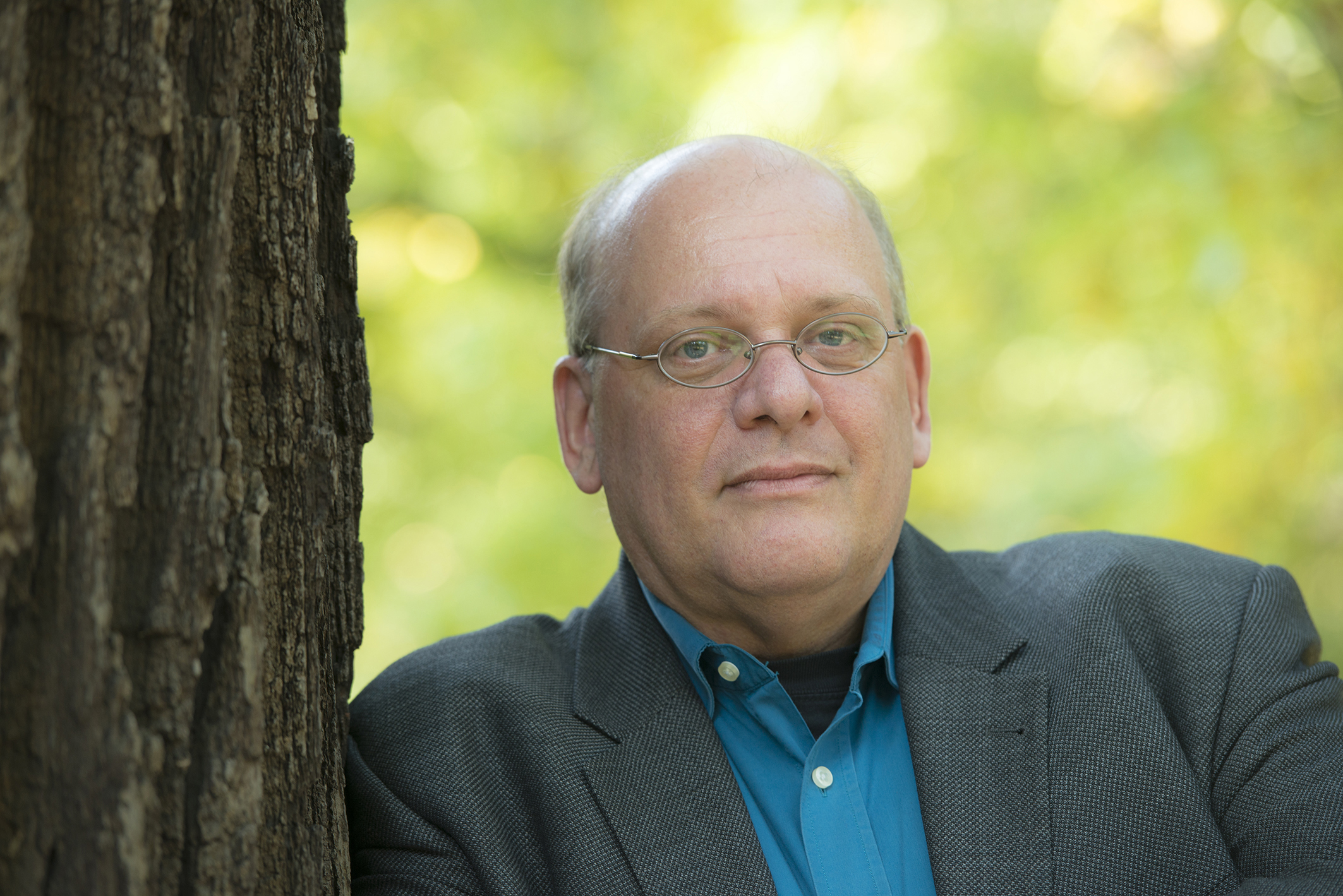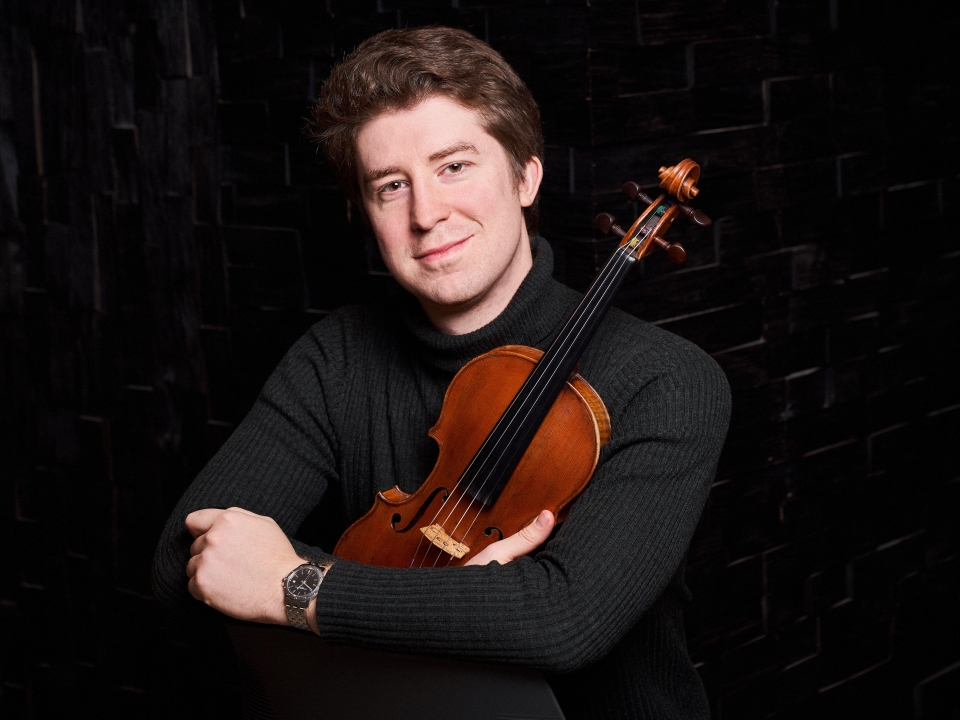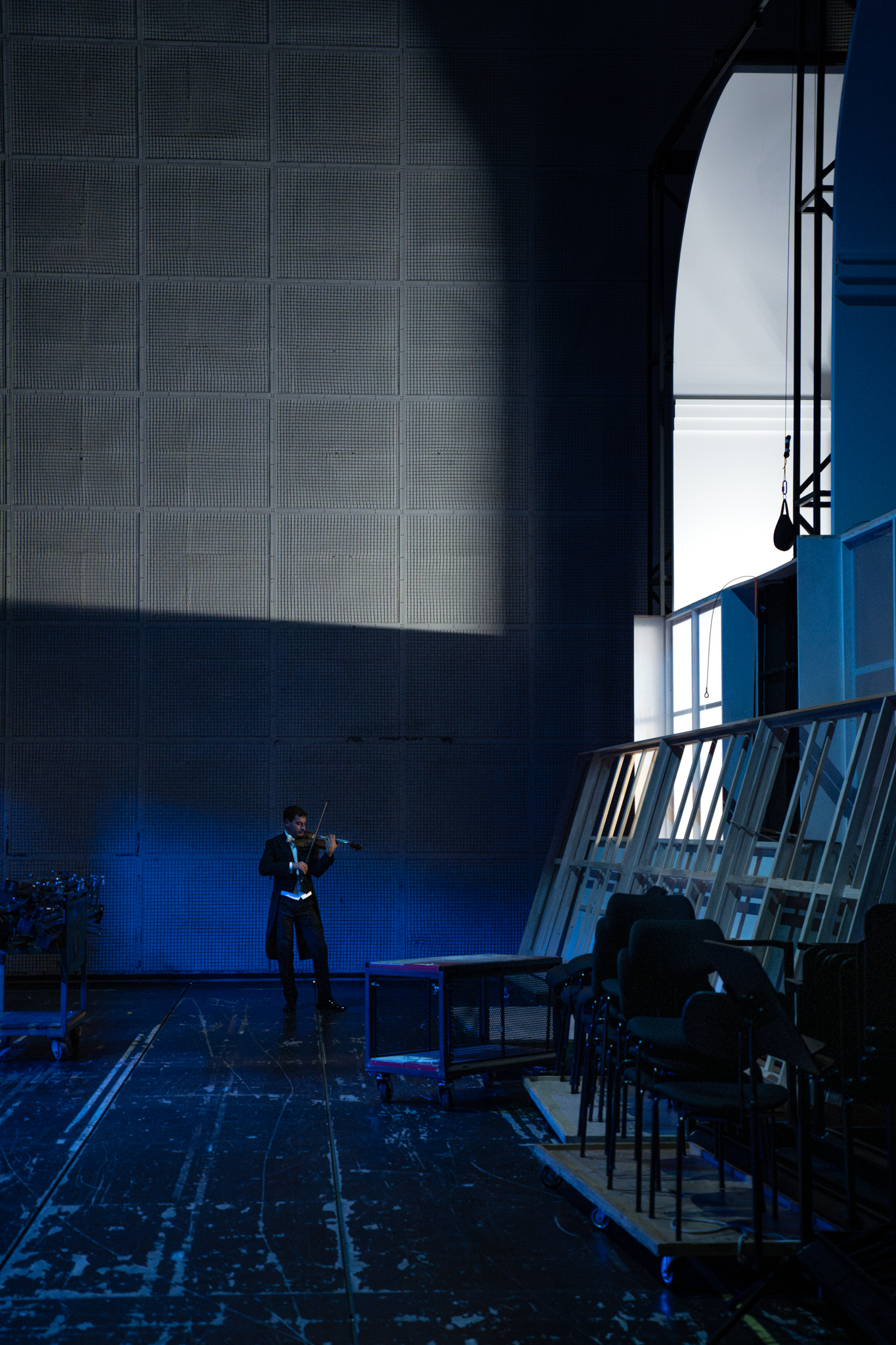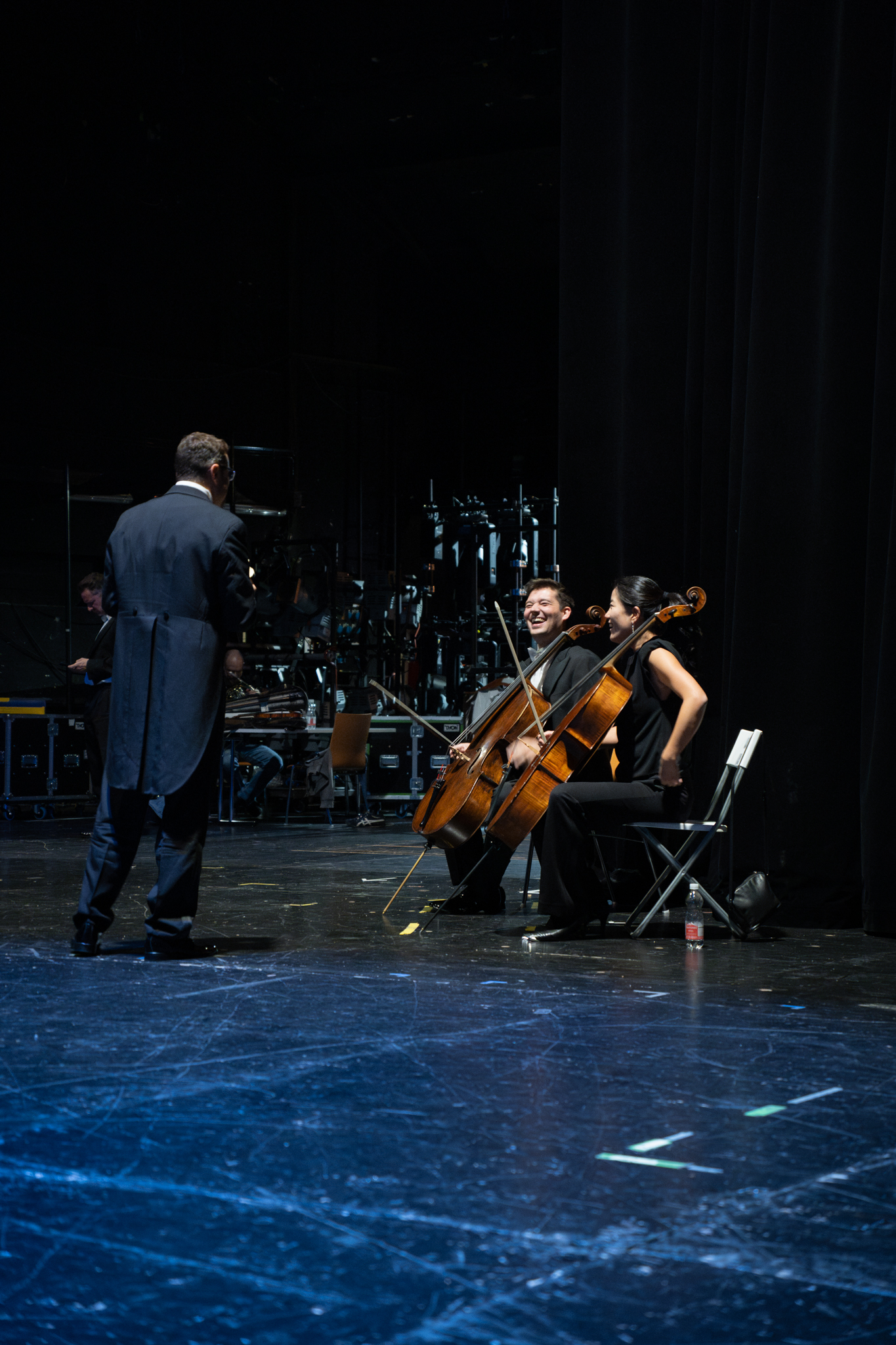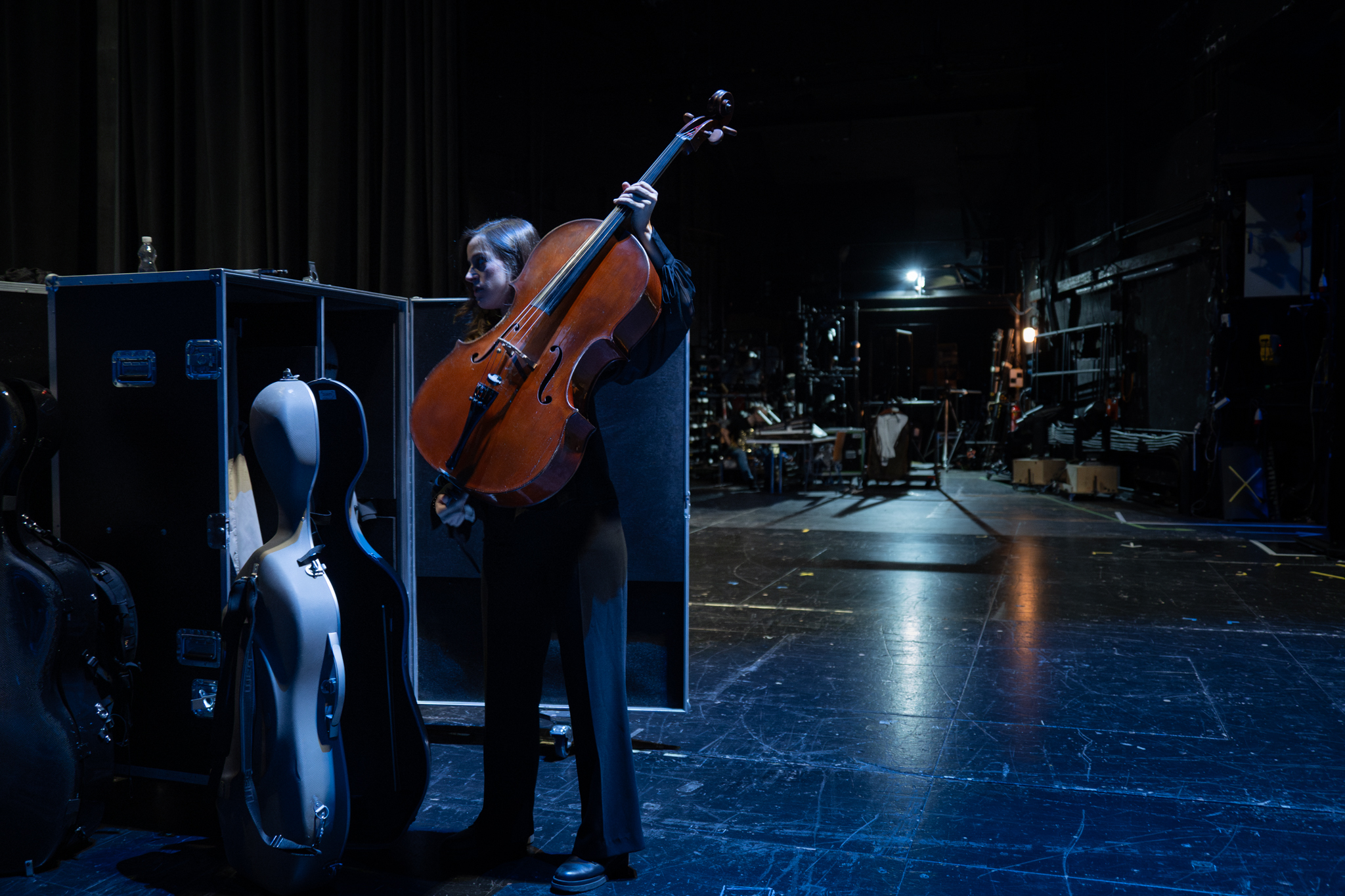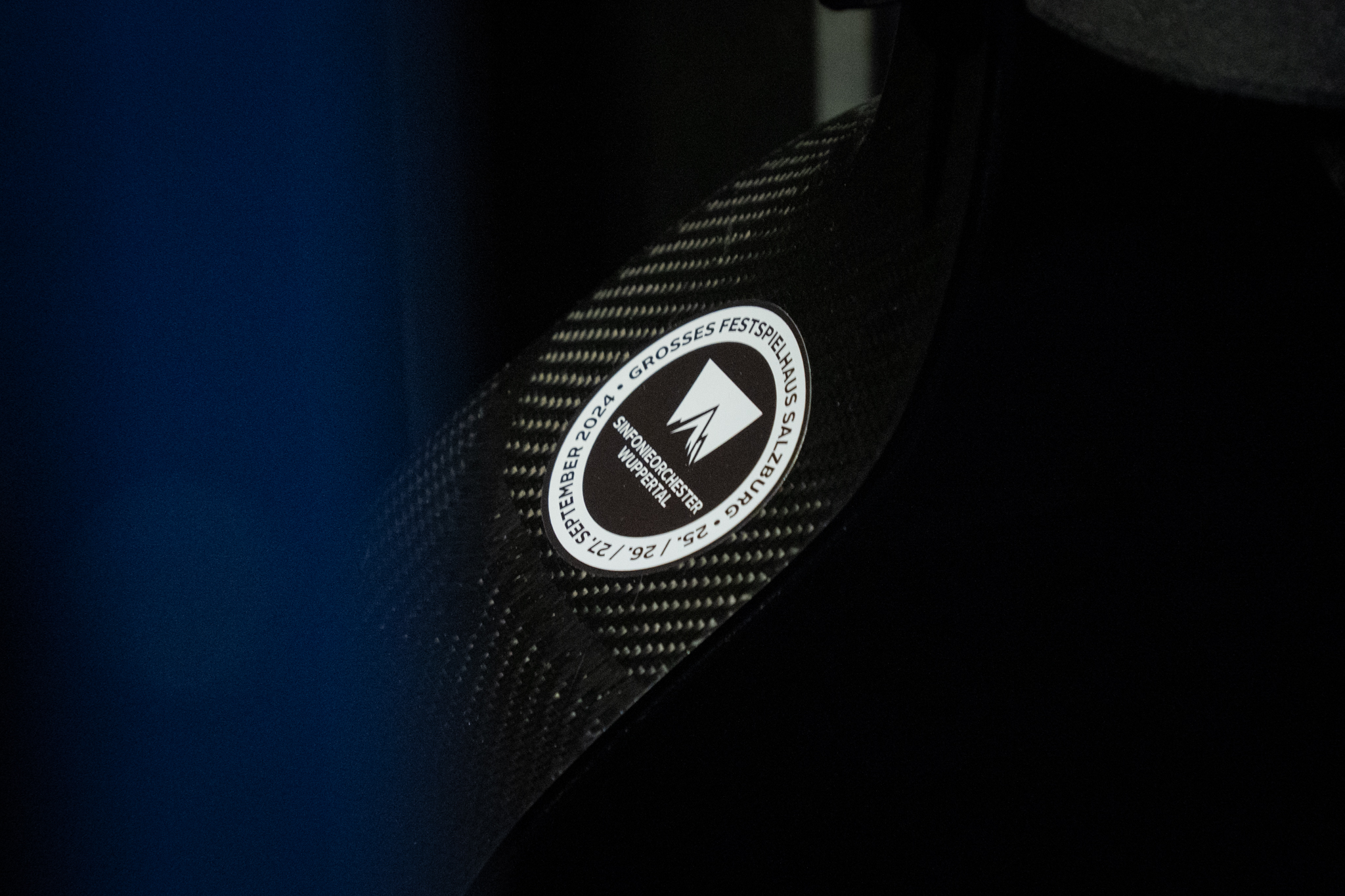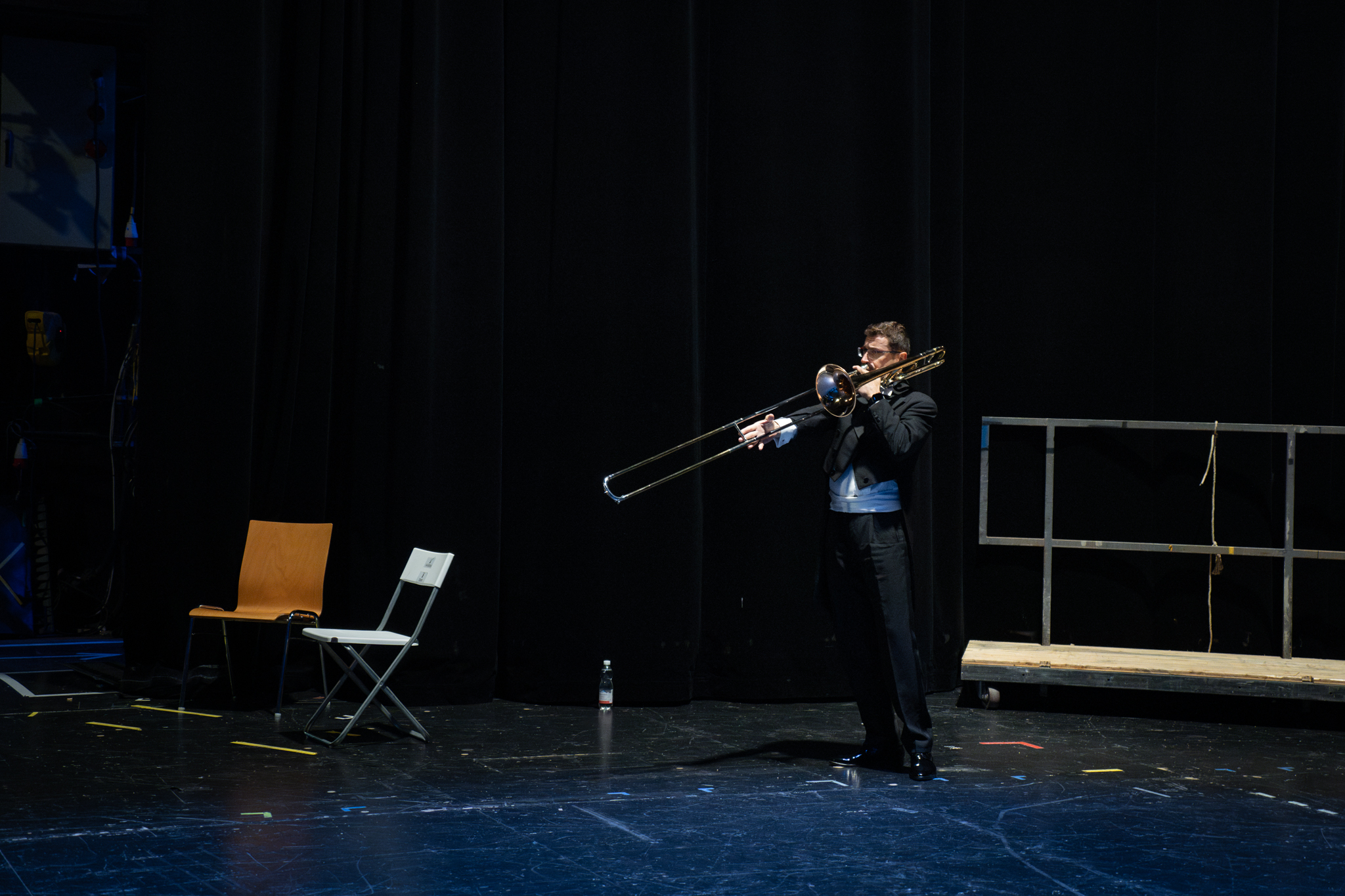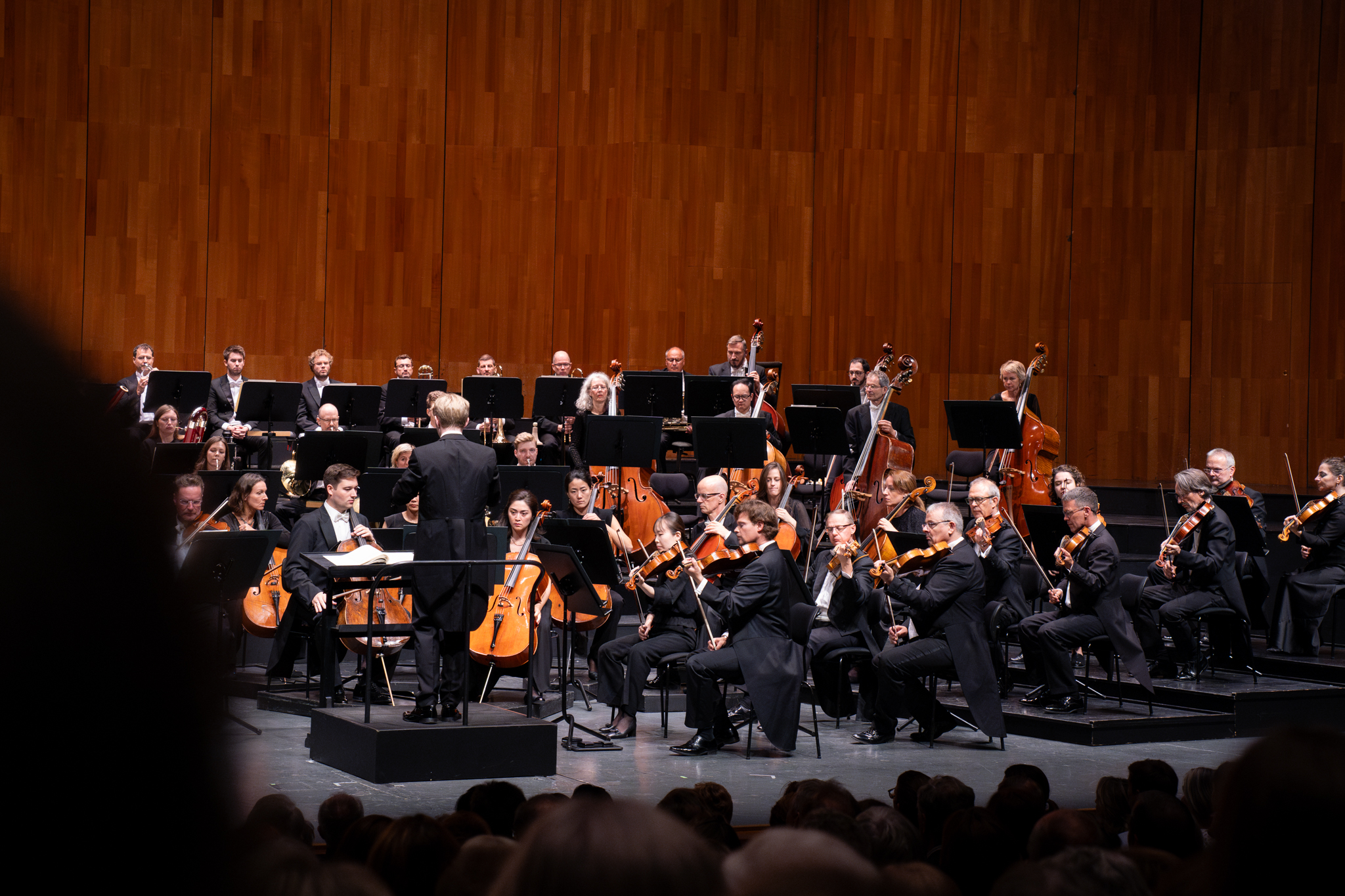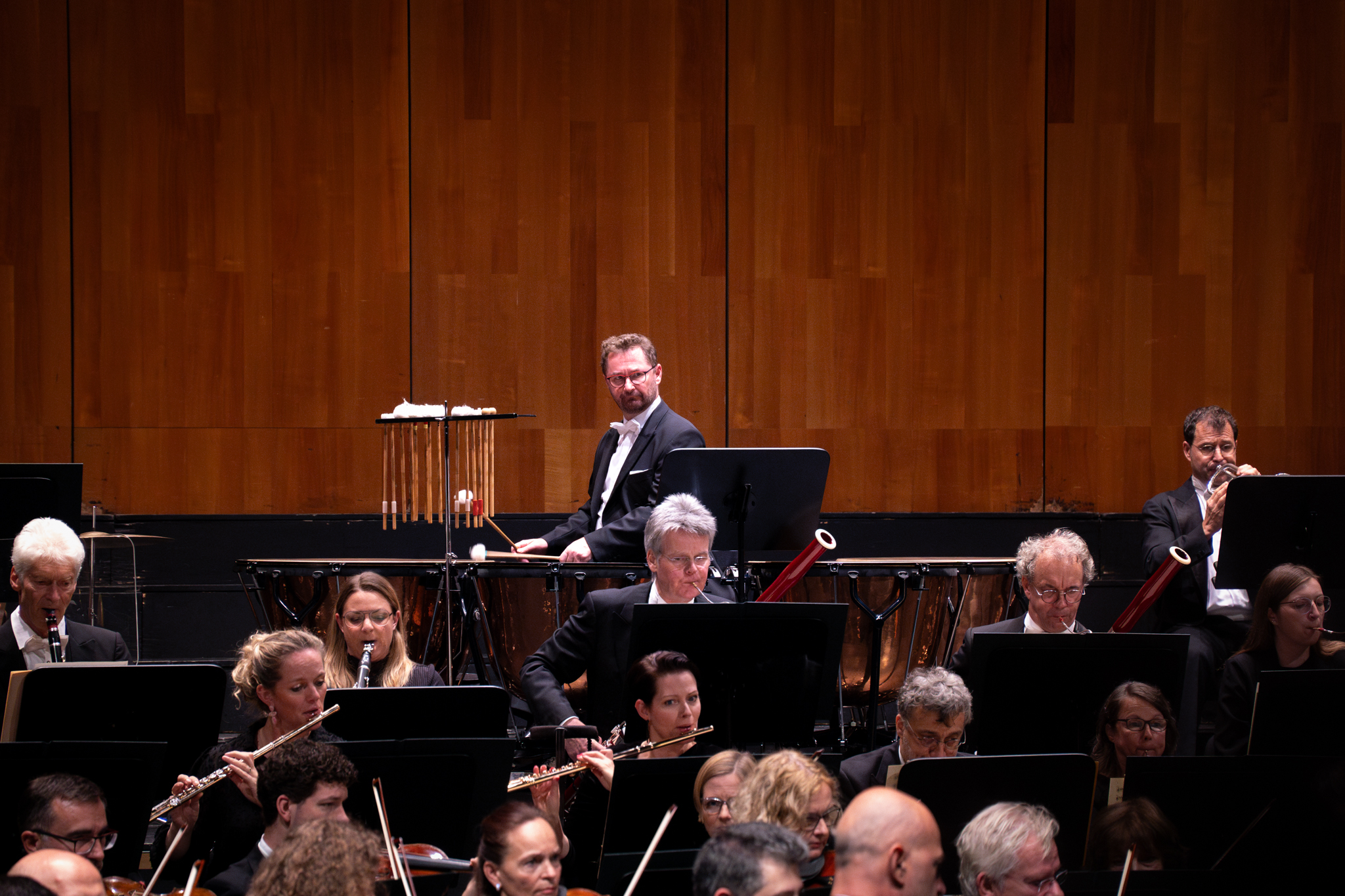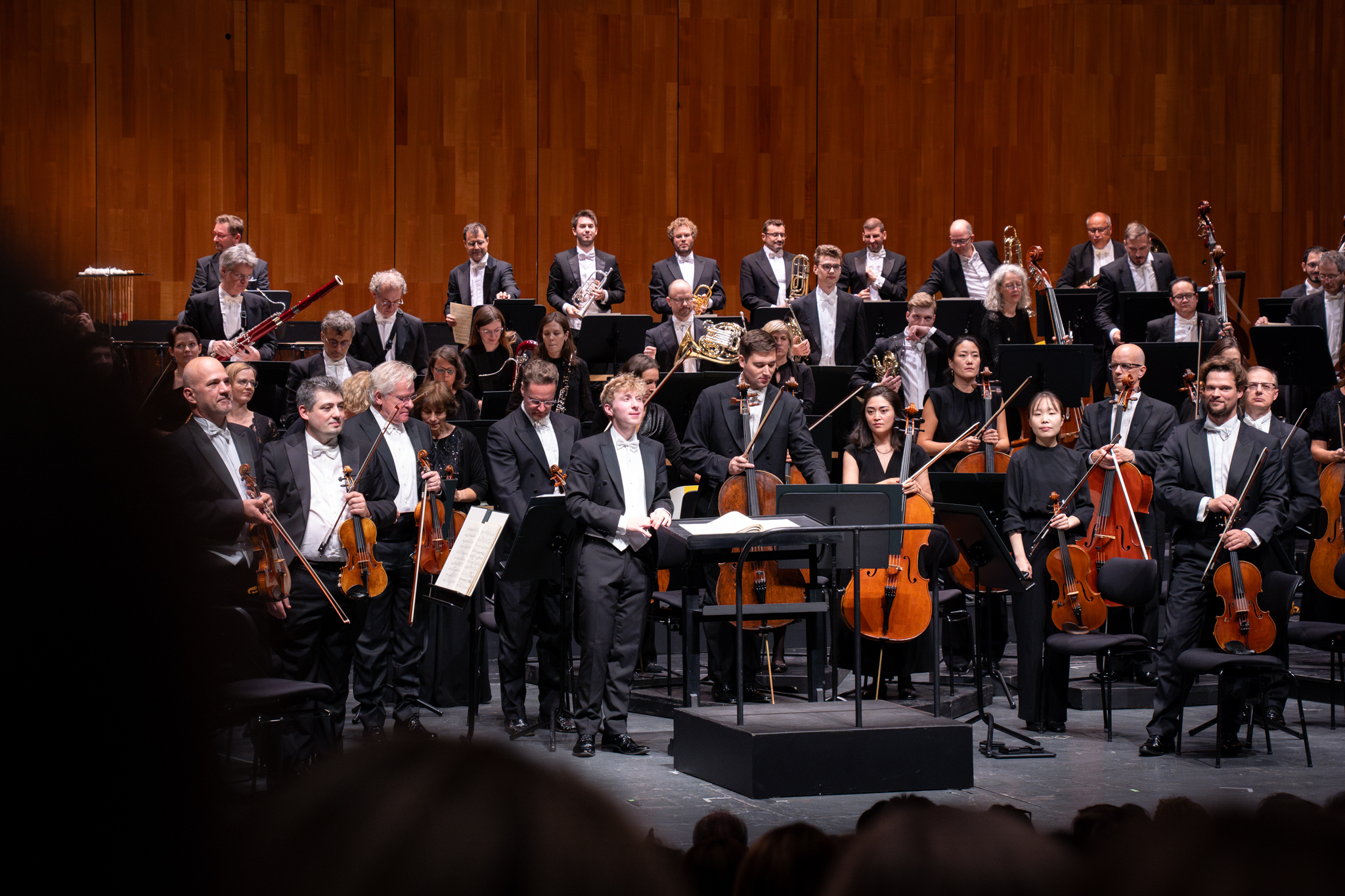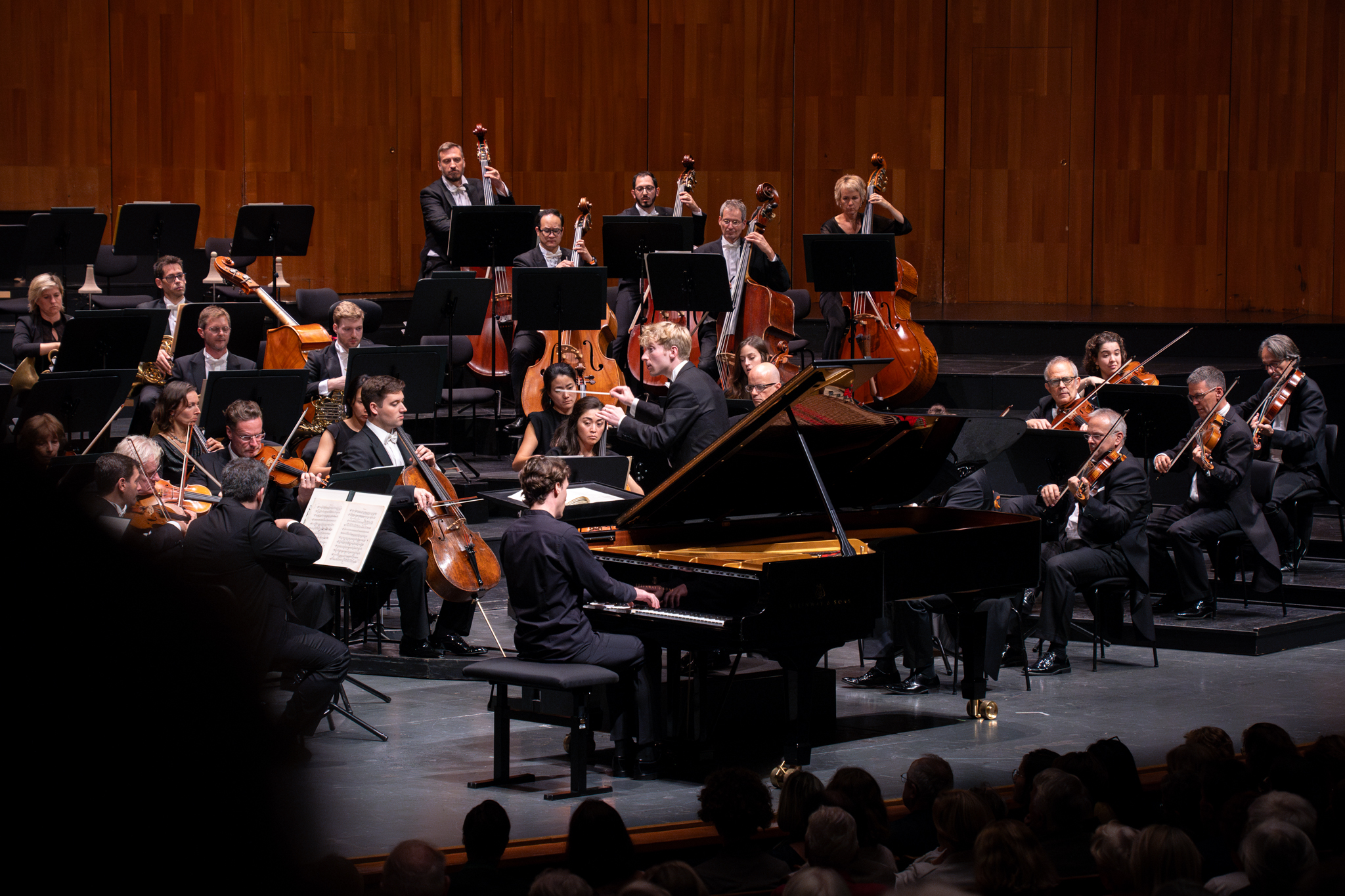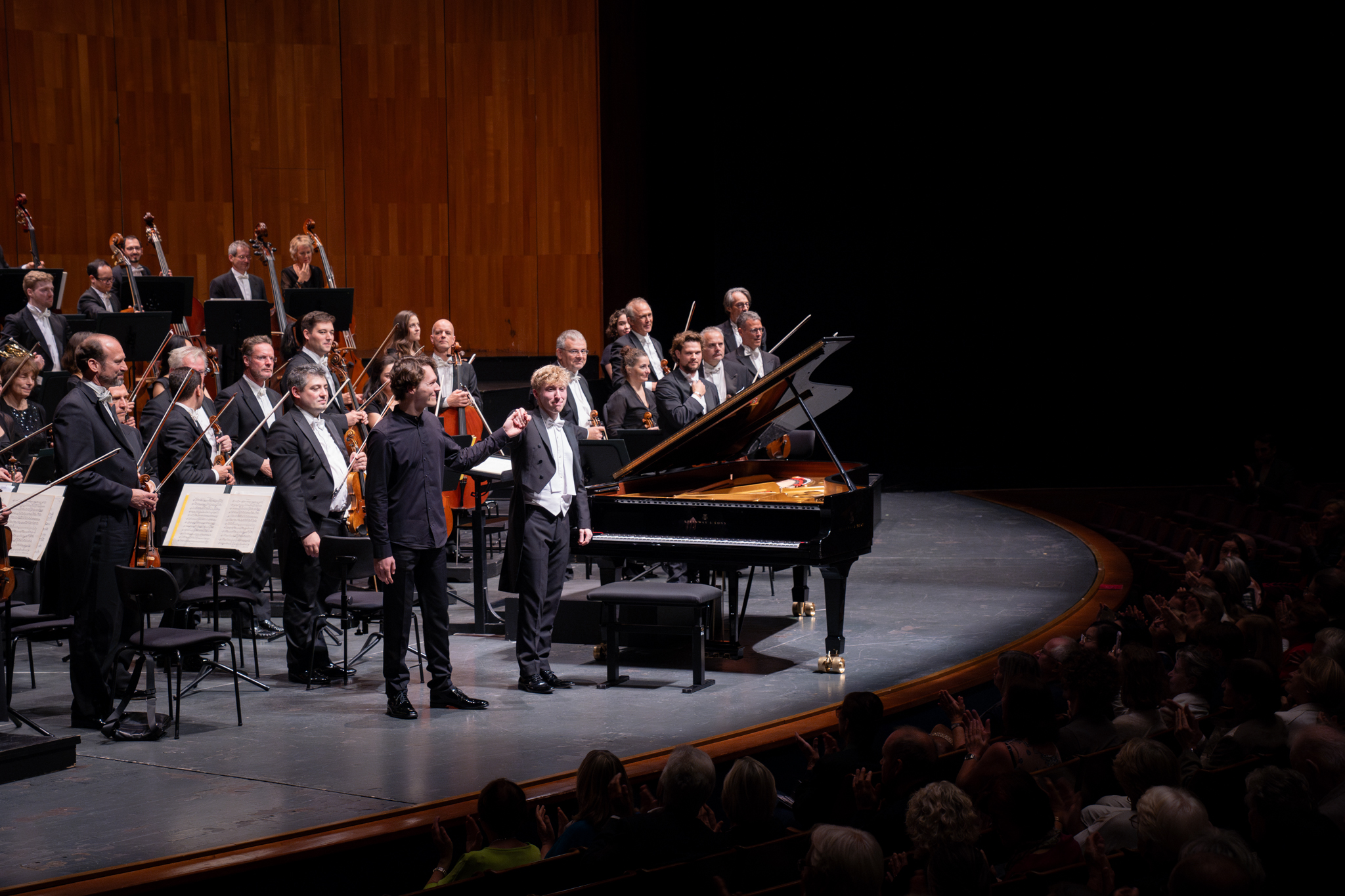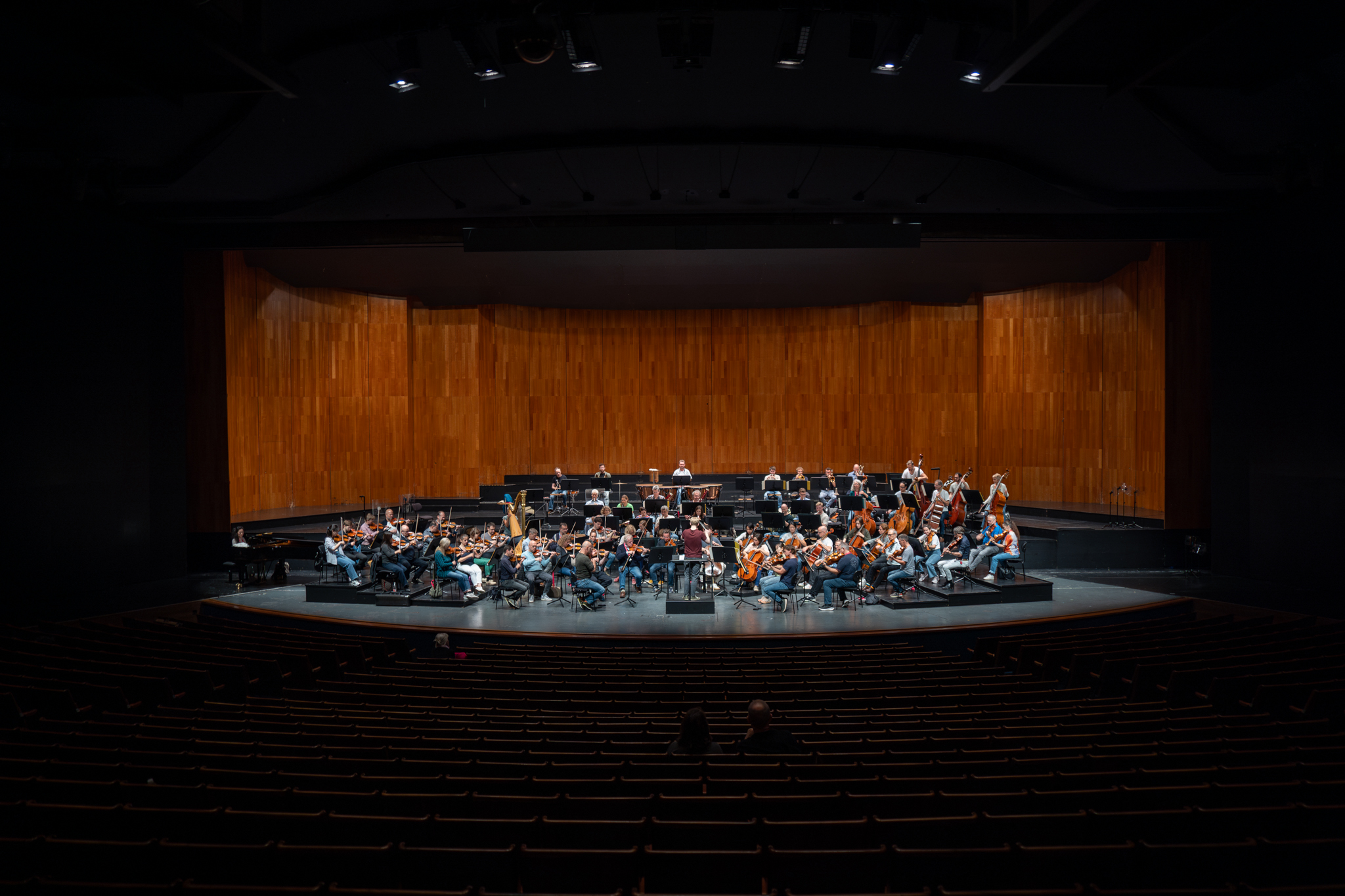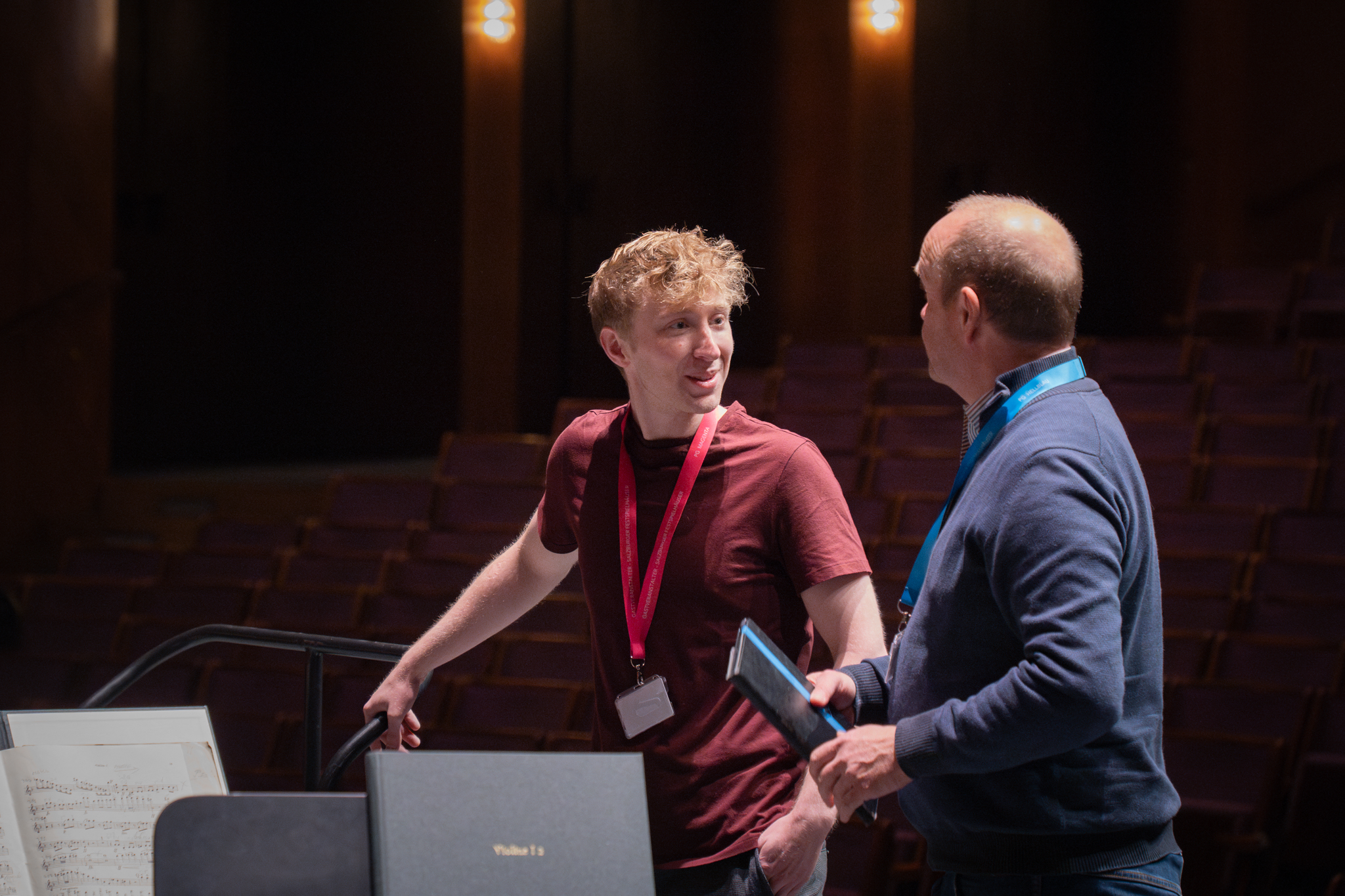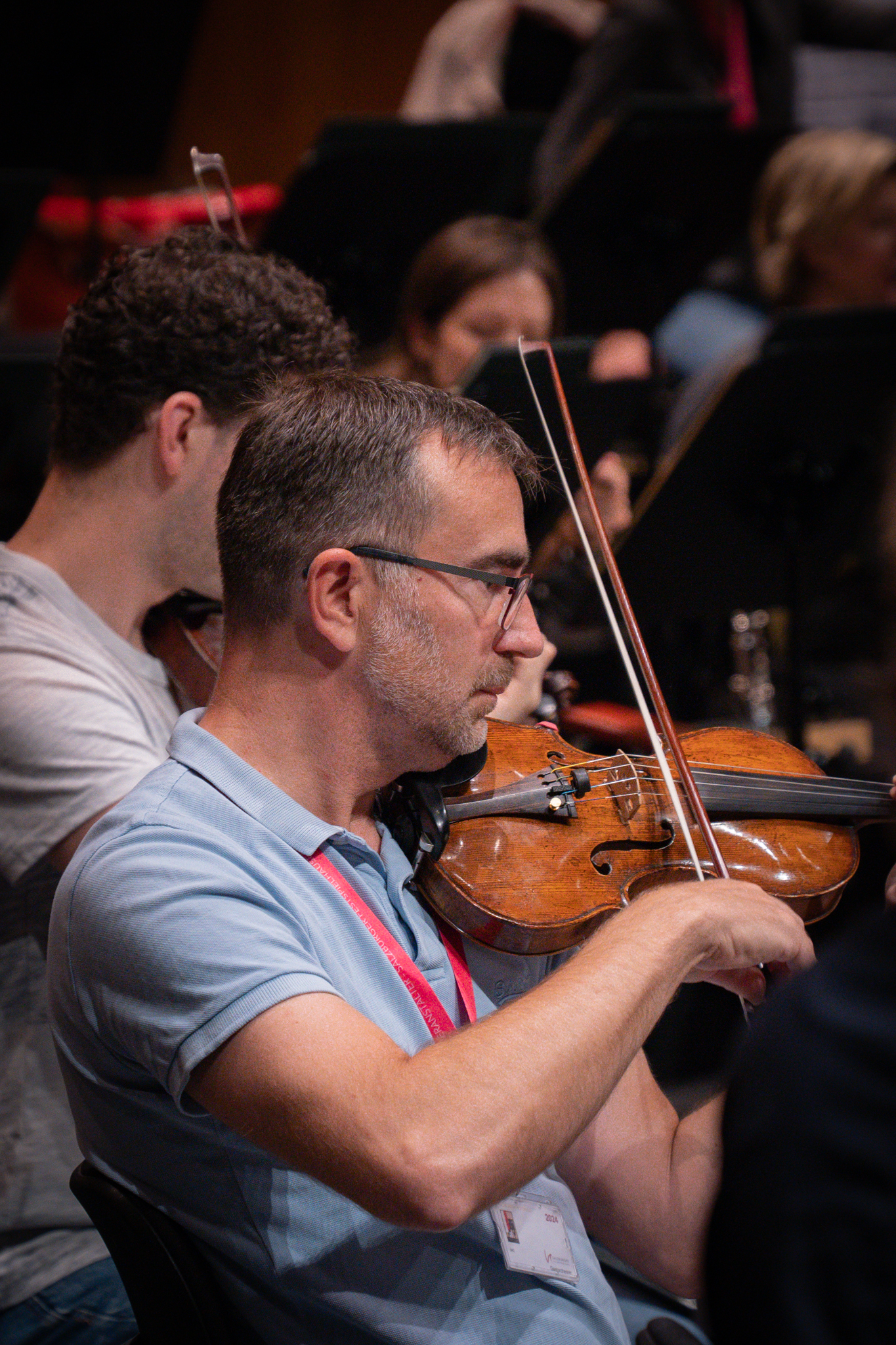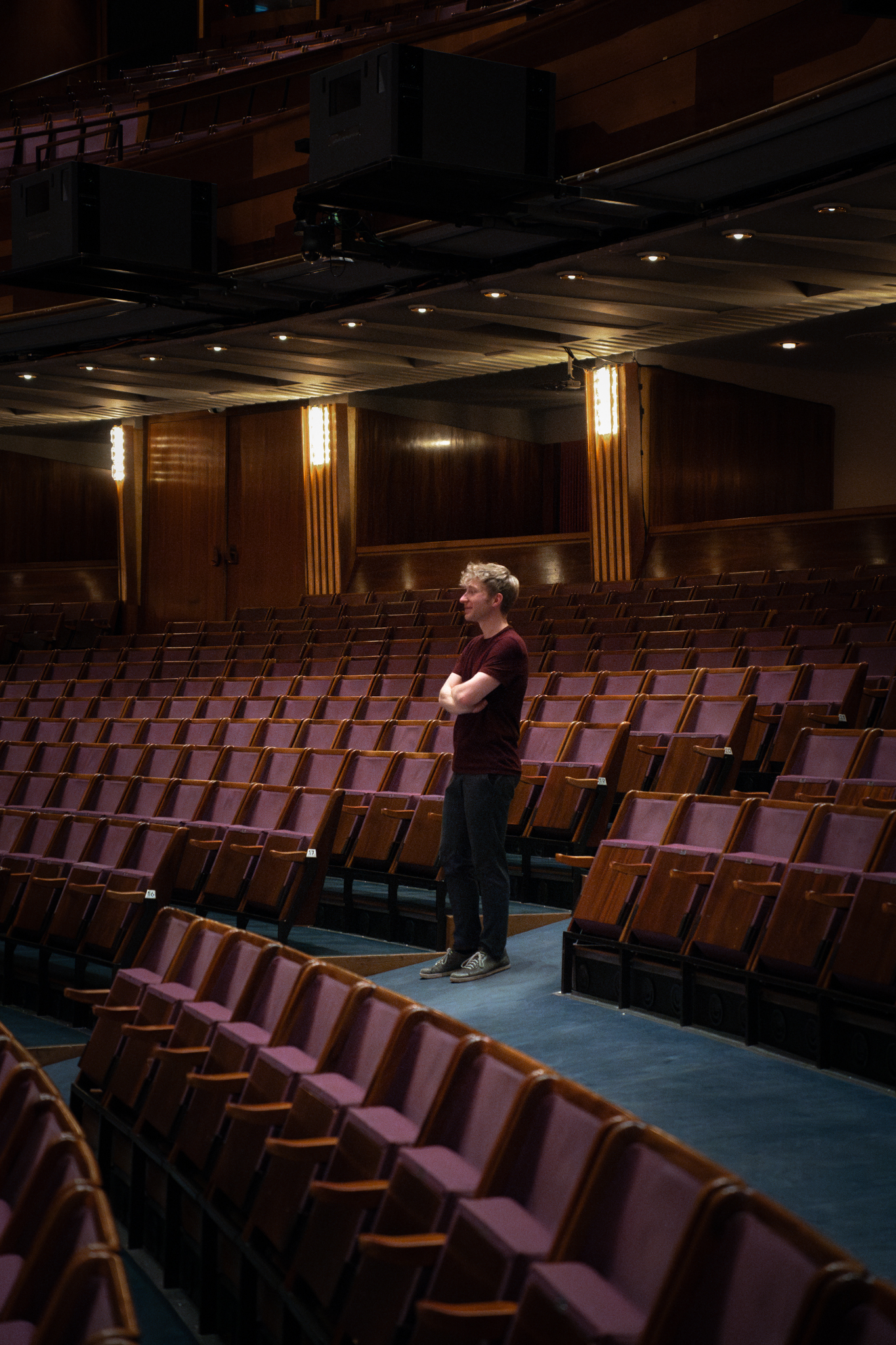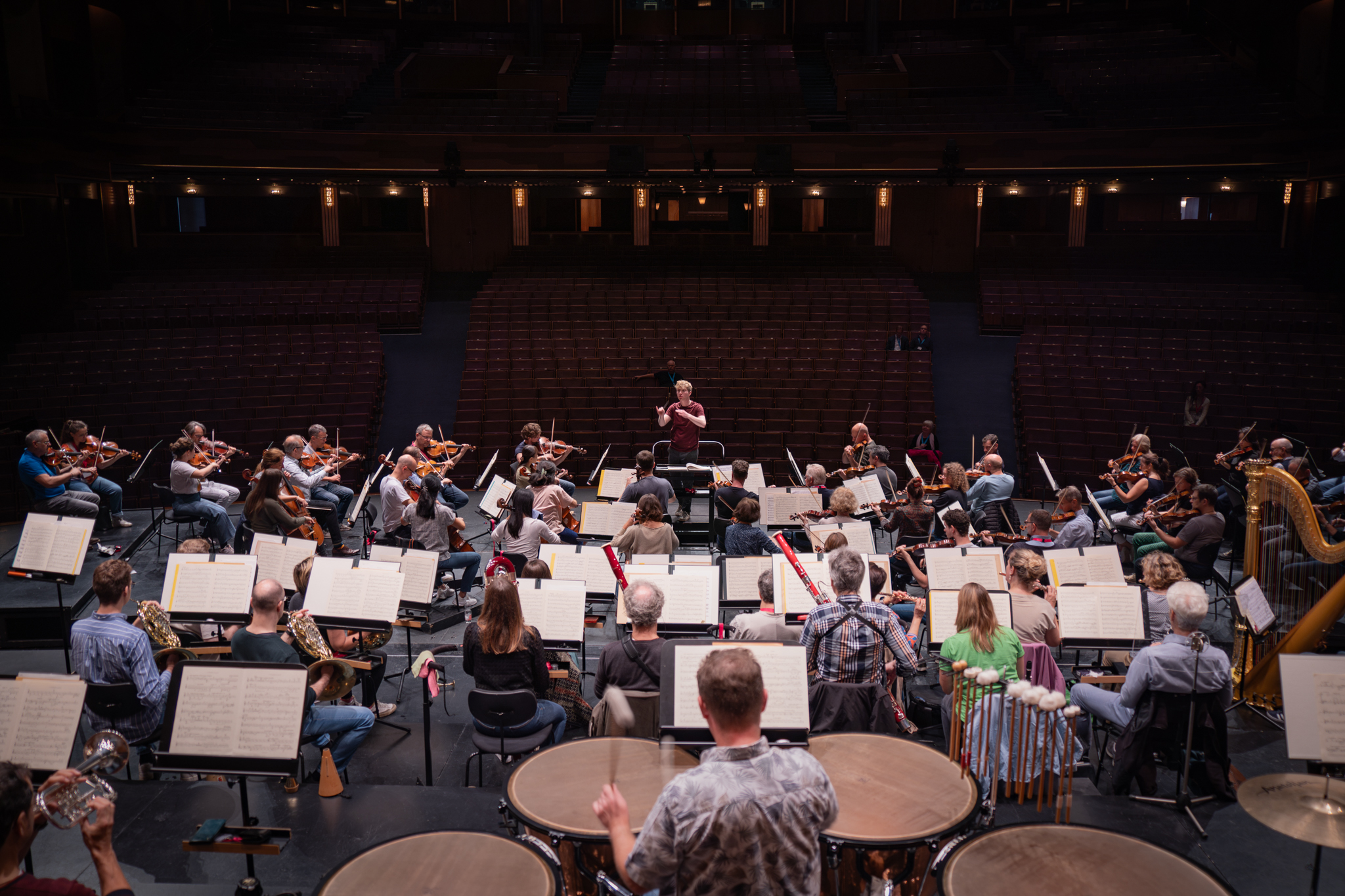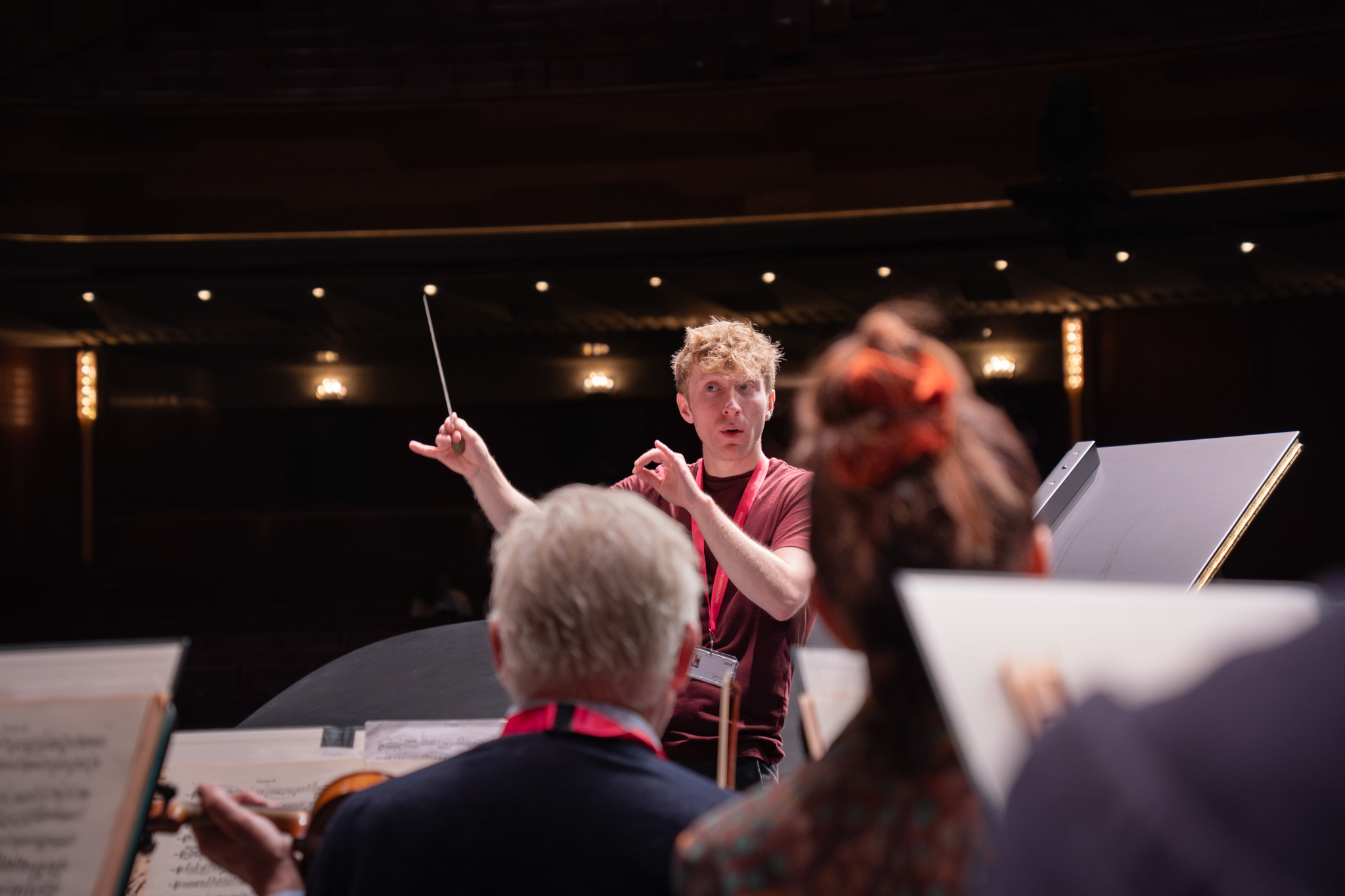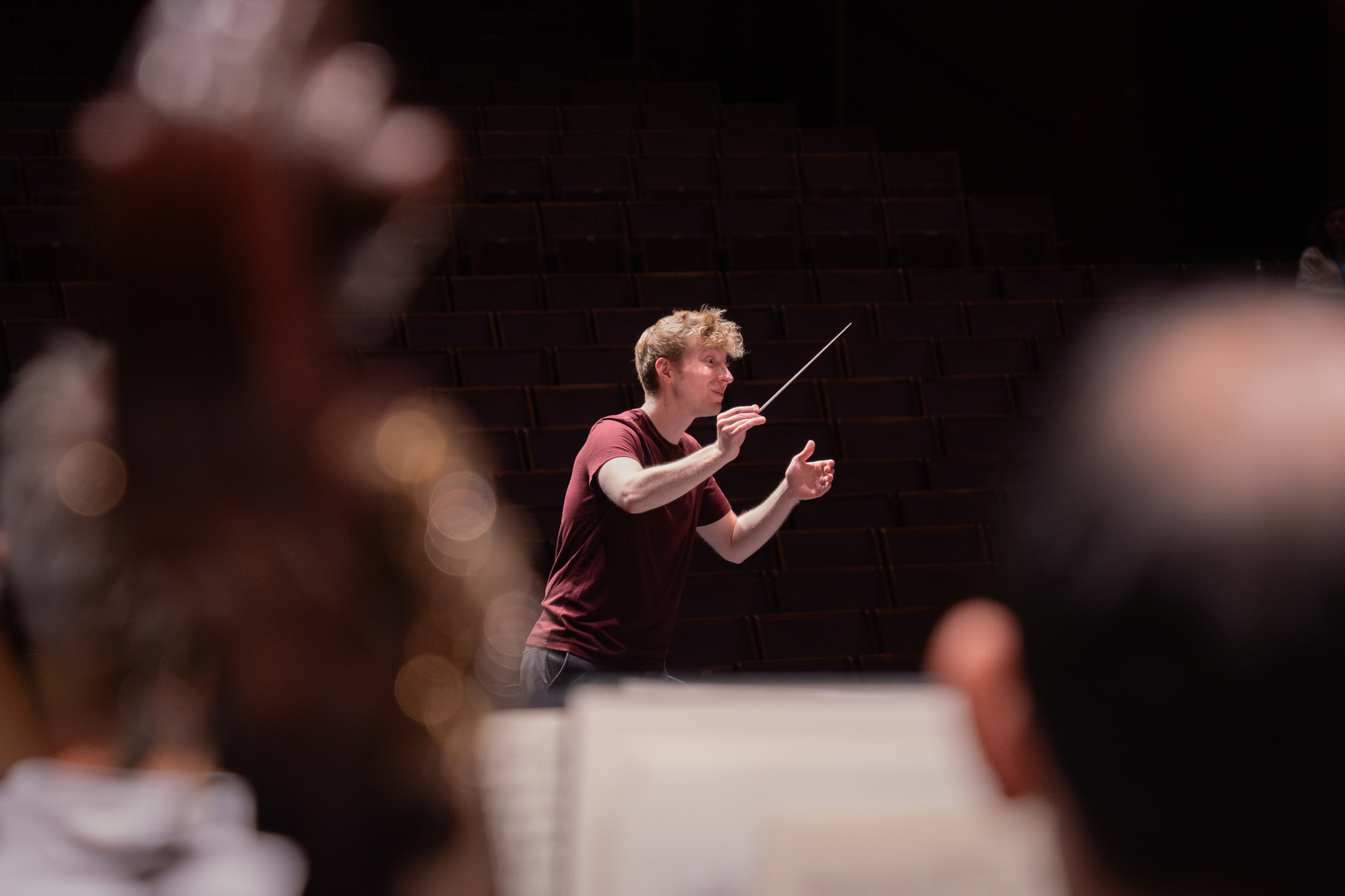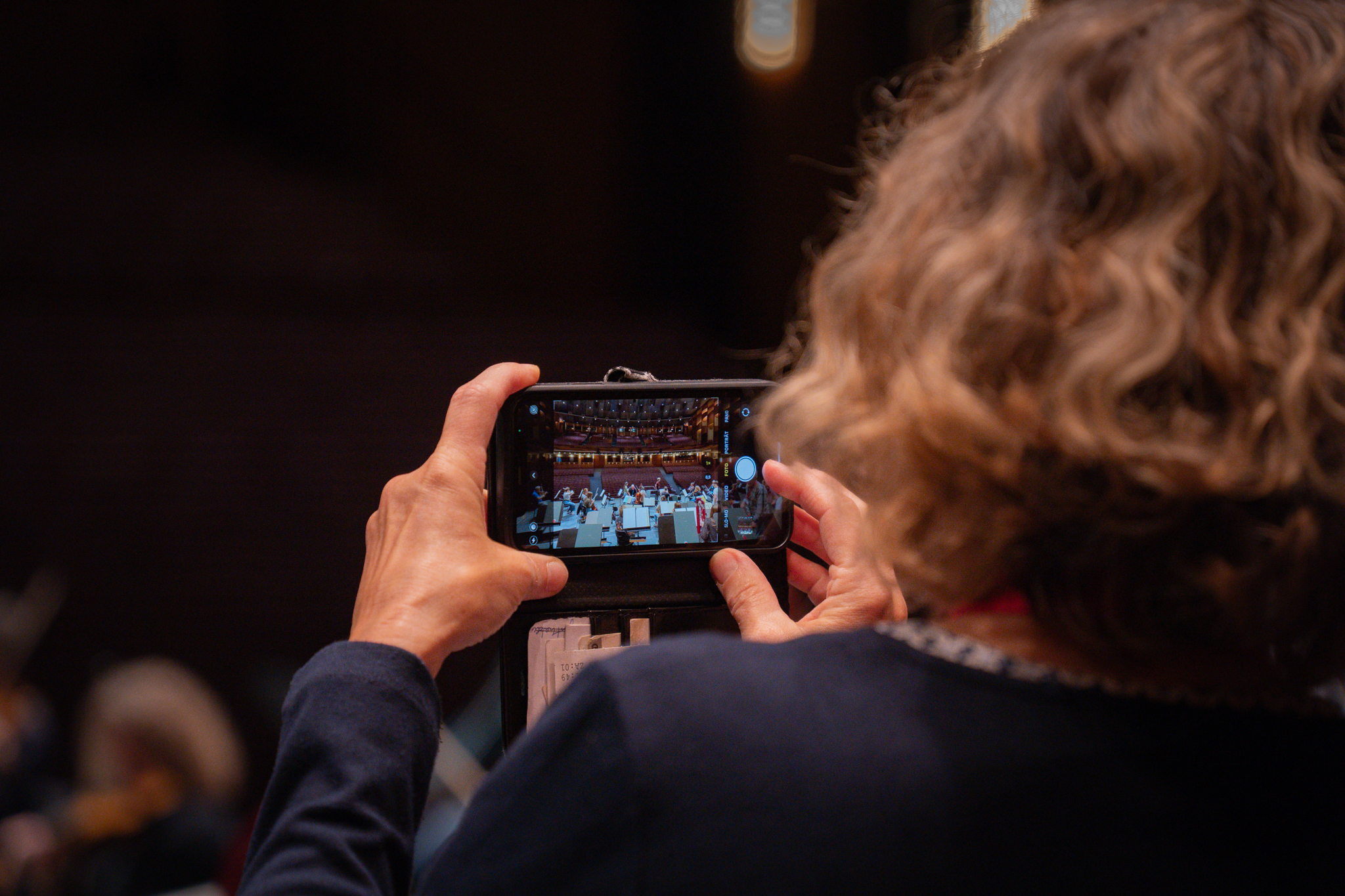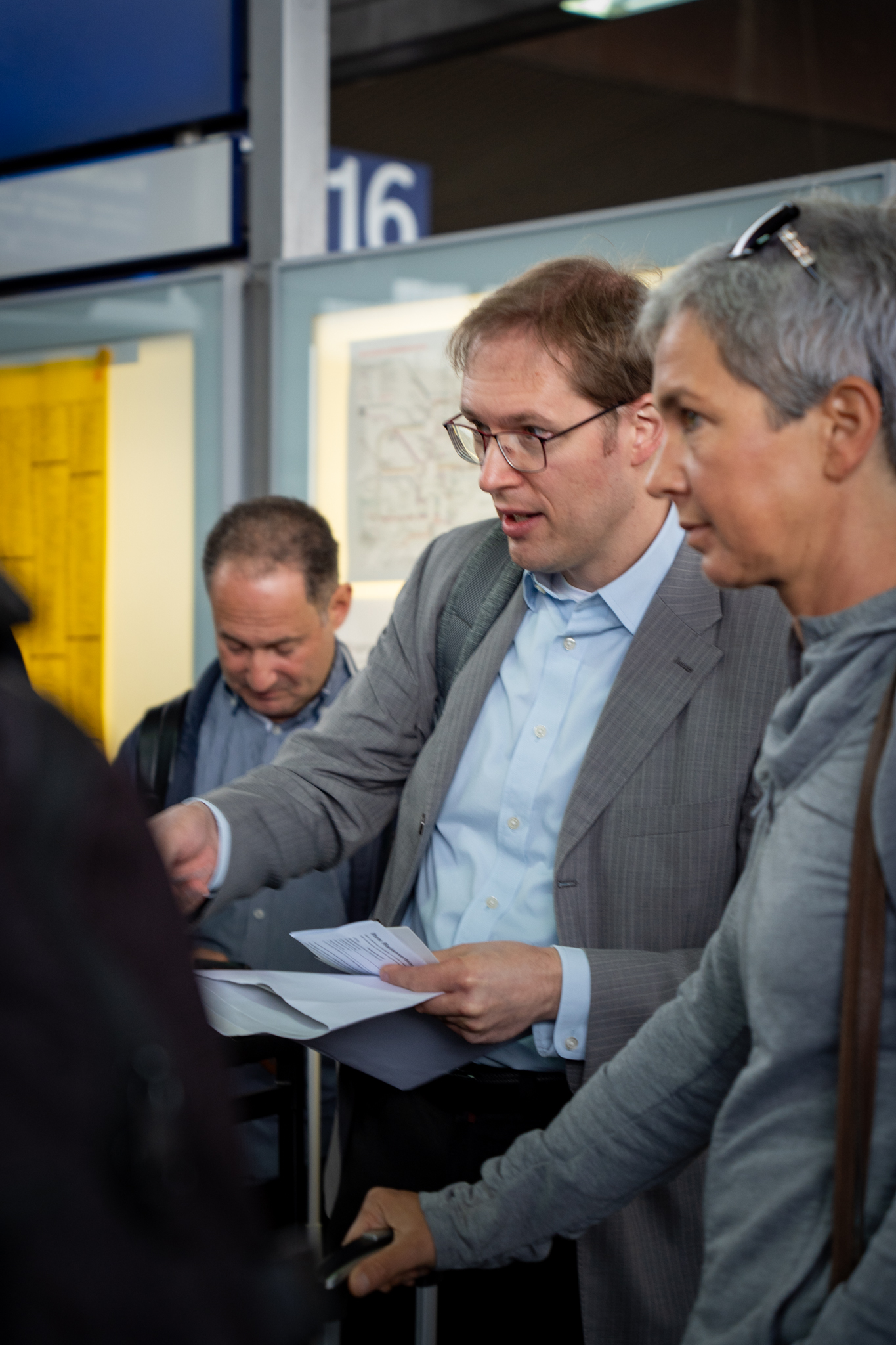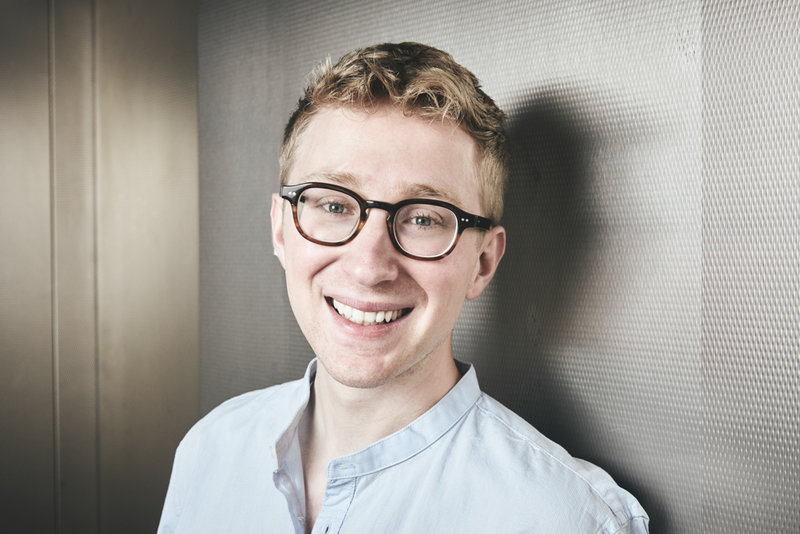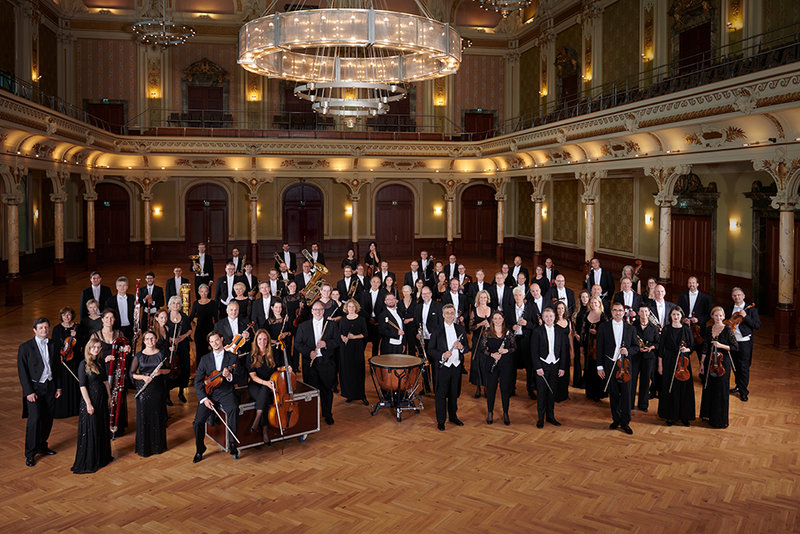Sa. 21. September 2019 I Interview, Text und Fotos: Daniel Häker
Daniel Häker: Mr. Chuang, how nice to welcome you again as our guest conductor so soon after the successful concerts you had with us in Wuppertal and Bochum at the end of last season. It seems that you already have taken a liking to the Wuppertal Symphony?
Tung-Chieh Chuang: For sure! Otherwise I wouldn’t have come back! (laughs) But yes, I learned to like this orchestra very much. It is mainly the way the musicians take charge - not only musically, but of many things in this orchestra. The musicians seem to have more say than the musicians in other orchestras appear to have. I can actually feel that in the music-making as well! The musicians in your orchestra somehow, through their eyes, tell me that they have their own opinion. They play with their own sound, their own interpretation, and in the end, it is actually harder to convince this kind of musicians because they really have a strong say in their daily lives. I find it takes more effort – I really have to convince the orchestra why I’m doing this or demanding that, but in the end, the result can be really fantastic! So that is how I came to like this orchestra.
I like your answer a lot because personally, I would say that an orchestra never can have enough personality. You need that as an orchestra, definitely! So I’m very glad to hear from you that we actually have that.
Yes, for sure, I felt that immediately! It is different with every orchestra, and even German orchestras are very different among themselves. Some orchestras come to work and like to take instructions, but the Wuppertal Symphony is not an orchestra that simply takes instructions. It is not easy, because your orchestra wants to be convinced in order to accept something I ask from you, and some other orchestras are easier to work with during rehearsals, but in the end, their result may not be as good as yours, because you take my instructions with personality and emotion, and in the end, after understanding and accepting, it becomes magic. So there’s always this extra step, and it takes effort, but it is worth it! So that is how I realised, all right, this really is an orchestra with personality. Our work becomes something like a conversation.
Thank you for that! - Does the Wuppertal Symphony have its own sound?
For sure there is the German sound, that is one of the traits of your orchestra that I like very much. Your German sound is very noble!
That sound comes out especially in our concert hall...
Yes, and that is what I was about to say – many orchestras play the sound of their respective concert halls, so your orchestra plays like it does because it plays in the Historische Stadthalle. That is the sound of the hall and that is very much what your orchestra has, very noble, sometimes golden, so that comes from the hall, I believe. One of the great things about going on tour with an orchestra is, you’re bringing the sound of your hall with you – essentially, you bring the city, you bring the sound of the people, you bring the voice of the people of your city with you. Like it or not, it is part of your DNA already. So, while learning to like the sound of your orchestra, I also learned to like Wuppertal more and more! But more to the point of your original question, yes, there is the German sound, but even more there is the quality of this nobility, and sometimes a touch of gold, and that is very much like your hall. And since the hall was built by the people, there is the voice of the people! Here in Wuppertal, you have a hall that represents the tradition, whereas for instance in Berlin, they have a new hall, a new sound, very inventive.
Actually, talking about Berlin – you chose to live there with your family. How come?
I was studying in Weimar, that was a fabulous time, I learned to love the German culture so much! And Weimar was kind of the perfect place for me to get to know Germany. A lot of history there... But after my student visa expired, I decided to stay in Germany longer because it is one of the best countries for classical music, and Berlin is one of the best places for classical music in Germany because it has more than seven professional orchestras and I have the opportunity to visit rehearsals and see a lot of famous Maestros at work. And so far, it is working out great for me so probably, I will even stay longer, maybe even permanently.
But you still don’t speak German?
Yet! Yet. My daughter however speaks German more and more, she’s three years old and goes to Kita now and will be a fluent German speaker soon, so I have to keep up with her! Yes, learning German is something I have on my list. But I already came to really love German culture, especially the Germans themselves, the German people! I feel that they are very, very different from Taiwanese people. Taiwanese people seem to be very close, very warm, and that’s exactly the opposite of the German people. Germans seem to be cold and separated in a way that they respect each others privacy very much. They don’t ask too much about your life – that’s your life, I have my life, everybody lives their own great life, but in privacy. But in the end, I find there is this very honest and true caring between the German people. We also see that in the Music, there is this warm touch in the core of the heart. I learned to like that very much. When they are your friends, they are truly your friends!
Before setting up camp in Weimar and later in Berlin, you spent some time in the US. But your roots obviously are in Taiwan ...
... in Taiwan, yes. I lived there until I was 16. Then, I went to Highschool in the US for two years and after that, to College. So the story was: My parents, or rather actually almost all my family are musicians. Conducting, Violin, Piano, Cello, French Horn... At my parents’ house, I grew up with almost 24 hours of music per day. Always somebody was playing. When I grew up, classical music really started to take off in Taiwan, so everybody wanted to learn to play a classical instrument, it was a fashion, a new thing, so my father, teaching French Horn, and my mother, teaching the Cello, had so many students and soon, I knew all the pieces they were playing. I grew up playing French Horn and Piano, so in all, music was very natural to me, so much so that I took it for granted, as if the only choice were to become a musician, nothing else. And that is a terrible thing for a child, because nobody should take anything for granted! It should be something you cherish, you should risk your life for something you want – my life may end tomorrow, but today, I play music! It should be something like that. But it wasn’t like that for me. I played more or less because of my inheritance, because of my DNA, because I was gifted, so that was a bad attitude I had. My parents noticed that as well, so they said to me, »Tung-Chieh, maybe you want to think about your life? You don’t have to do music, you know, think about it – maybe you could do Math or Science?« And I was so immature that almost immediately, after two days, I decided, sounds good, let’s do something else! I’m so bored of playing Piano and Horn! So my parents sent me to this Highschool in Pennsylvania, in the smallest of towns, and after that, I got into Purdue University, which is actually a rather good University. So I was a Math major there and graduated in Applied Statistics. But during my last year there, I started thinking again – I could probably make a nice career in Statistics, make a lot of money, or do I want to reconnect with my childhood? And that time, the thought process took longer, a month or something. And I decided, yes, music is something I really can not live without. The moment when you step on stage, the audience applaudes and then falls silent, and so many silent people are waiting for the first note to be played, and after the first note, almost everybody thinks and feels the same – that is something you simply can’t achieve with Statistics, it’s just not possible. That is incredible!
Speaking of reconnecting with your childhood, there was a recording that had tremendous impact on you when you were young? Brahms, Haitink?
Yes, huge! My dad is a big collector of records of classical music, LPs, CDs ... So as a boy, I just randomly picked up Bernard Haitink’s recording of Brahms’ 1. Symphony. And when it started to play on the stereo, the beginning with the Timpani, it blew my mind! I couldn’t believe there was that kind of music! It took Brahms 40 years to write that, and it really sounds like somebody held something inside for so long until finally, it came out with that huge explosion. So for me, my path to conducting was not based on visual impact, on having seen other conductors, but purely on hearing. 100 % audio. I heard that music and thought, I want to make that music one day. And even today, I would say that it is all about hearing and feeling the music in your heart.
Did you ever consider becoming a French Horn player and not a conductor, or was it always about conducting for you?
I love the French Horn! I considered playing it professionally, but when I decided to become a conductor, I hadn’t played the Horn for eight years, so it probably wouldn’t have worked out. I wanted to, it is an incredible instrument! I still play it from time to time, and I really respect how difficult it is. But anyway, Brahms’ 1. Symphony was my gate into the world of orchestral music. After that, I listened to Mozart and then also to Debussy, which had an life changing impact on me as well. I couldn’t believe how Debussy was able to write for the orchestra. La Mer!
Do you have preferences as far as composers go? Any favourite composers?
What I really like, and it is almost like a fetish, is to discover music that is rarely played but that really is worth to be discovered. The Sinfonietta by Poulanc, for instance. Such a great piece! Or some pieces by Korngold. Fabulous music! But I love music from the classical period as well, of course, I do a lot of Haydn and Mozart and Schubert with several Chamber Orchestras as a regular guest conductor.
What is your take on the program you’re working on with us now, Schubert’s Unfinished and Mahler’s 4. Symphony? You had to take over on really short notice, after all?
It is a beautiful combination, very well constructed! Both symphonies are examples for composers trying to get out of their comfort zone. Pieces written in moments when the composers had the most doubt. Schubert was so doubtful, he didn’t even finish the symphony. And Mahler was so doubtful from his first symphony on, that this symphony becomes totally different. Because he was in doubt if going bigger and bigger actually worked, so he thought, »maybe I should do the opposite«. So this is the smallest possible Mahler setting, without Trombones. And after Schubert’s Symphony ends very peacefully, Mahler’s music starts with a kind of sarcastic, twisted commentary by the Sleighbells in the very first bars of his 4. Symphony.
During your first rehearsals with an orchestra for a new program, you seem to be very well prepared and very controlled, and you seem to have a clear vision of the musical result you want to achieve. How do you combine that approach with encountering strong personalities in the orchestra you’re working with, as we talked about earlier on in reference to the character of the Wuppertal Symphony? How do you merge your vision and the opinions of the musicians?
There is not just one equation for merging my ideas with those of the orchestra. It is like a conversation. It is never clear where this is going to end up. It is always changing, even from day to day! So I have to constantly adapt as well. But first, I need to establish the structure. So my very controlled way of rehearsing that you perceive probably comes from my background in Applied Statistics. That is what I try to do for the musicians – first we need to understand and establish the structure of the piece, and then, in the end, we can sing and forget about the structure, but first we need to understand and master it in order to be able to forget about it afterwards. It is not easy to master the structure of Mahler, it is quite complicated! It takes more than two or three days. So during the rehearsals, I don’t want to break the structure by bringing in too much emotion too early in the work process while the musicians still are trying to figure it out. It is like a form in Kung Fu – first you have to master it, then you have the freedom to express yourself. You don’t start the other way round. Anyway, as to the second part of your question – I come prepared, but then, I have to listen all the time to what the musicians offer me! When I as a conductor start to listen, then the conversation begins. It is not about the conductor talking or trying to tell the orchestra something – it is about listening.
What would a successful, perhaps even magical, concert be like for you?
It is not about achieving something, achieving a goal that I set beforehand, it is not about that! It is more about being in the moment. Feeling that during the duration of a symphony, the musicians are with me at any moment in a way that they feel comfortable about the form, the structure. Because then, they are free, and we both can feel that! Free to express themselves. That is a great concert, and it doesn’t matter how many wrong notes happened. We feel free inside the form, we can really sing from the heart – that’s it! That is the moment, that is the place we want to go. And during the rehearsals, I want to prepare the orchestra for that moment so that when the concert comes, we can feel free. The concert in Bochum, when we played Tchaikovsky? That was like that. Almost like I didn’t even have to be there because the orchestra was so involved and had reached that state of freedom!
Do you conduct Opera as well?
No, so far I don’t, but I would love to! I feel that as a conductor, you’re living only half a life if you don’t conduct Opera as well.
Your obvious talent notwithstanding, I suppose you have to work hard, constantly and diligently in order to master an ever expanding conductor’s repertoire, and I also assume that in a way, though you actually come across as rather humble, you have to be ambitious. So is there room left for something else? How do you manage the life of a guest conductor who already is quite in demand and thus travelling to many different countries in the world?
As far as ambition goes, I am especially interested in this question: What purpose does the orchestra or the symphony or the music serve in society? For instance, the Wuppertal Symphony has great meaning to the city of Wuppertal! I feel that as a chief conductor, the job is not only to give concerts but more importantly, through giving the concerts, to slowly, during six, or eight, or ten years, find our position in the city. How, and why, are we affecting people’s lives in the city? That to me is much more interesting! You know, doing music is great, but in the end, we have to understand, Mahler wrote his music because he lived in that society at that time and he writes about that society – therefore, when we play his music, what does this music mean to our society nowadays? This is a different society, a society with WiFi, with fewer trees... So my ambition lies in that, to help the orchestra. On a greater scale, what does music mean to the humans, to the world? Every orchestra has to find its own meaning for the society. How do we musicians position ourselves? We have to do a lot of thinking. What are we? Why are we playing music from a hundred years ago? We could just play today’s music, but no, we are still playing Mahler. So what can that music remind us of? We want to preserve our beautiful environment against the Global Warming, and we also want this beautiful music to survive! So that is where my ambition is directed to.
Still, there is a second part to my question about ambition. You’re on record saying that you dislike conducting competitions, but on the other hand, you did participate in some, and quite successfully, I might add. You are the winner of the 2015 Malko Competition in Copenhagen, and you have been awarded several prizes at the Solti Competition in Frankfurt and the Mahler Competition in Bamberg. Does that mean you simply acknowledged the fact that participating in competitions is a necessary step in the process of building a career as a conductor?
Yes! But the thing is, every case is different. I’m not saying everybody needs to participate in competitions in order to get a career – there are enough examples for careers without it. But what I want to say is, if you want something so badly, then you will find a way to get it, and that is simply what I did. I wanted to make music so badly! I didn’t want to sit at home, doing nothing or just reading the score and imagining the music without getting all the musicians you need to do it together. My nature is to conduct orchestras, that is what conductors do, so probably the only way for me at that time was to participate in competitions. And even when I won one or two, it was not enough, I still wasn’t getting enough jobs but only two or three concerts a year, which is not even close to what I wanted. So I had to participate in more competitions though I disliked it from the very first moment. I just feel that it goes against the nature of the music. The nature of the music is actually without goal, like I said before, it’s in the moment, it’s not like, »in the end, we have to go exactly there«. No! It’s all about the progress, it’s in the moment and how we go there, not »Go there!«. Conducting competitions are all about who wins the first, the second, the third prize, but that is not the nature of the music, so I dislike them – but I also dislike just having two concerts a year! (laughs)
Part of one of the prestigious awards you won was an invitation to conduct the Vienna Philharmonic. Did that actually happen? Did you conduct them?
No, that hasn't happened yet. But it will be something very special of course!
We already talked about goals as far as working on a piece of music goes – but taking a much broader, more general perspective, can you tell me about dreams and goals you would like to achieve in your life during the next, say, ten or twenty years?
That is a wonderfully difficult question to answer! I’m so much of a »Live in the Moment!« kind of a guy, it is very difficult for me to picture myself in ten years. I know a lot of people who are setting themselves goals, »in five years I’ll do this, in ten years I’ll do that«, and yes, I can do that, I can make plans, but it’s so unnecessary, especially for musicians, in my opinion, to set goals because it is a career with so many surprises! You never can predict what the next day will bring, like this week – I couldn’t have imagined coming back to Wuppertal so soon, and I couldn’t have imagined doing Mahlers 4th, one of my favourite pieces of music, with you. So this is really unpredictable and I’m not going to predict what I’m going to do in five years! And anyway, can we really plan our future? Is it really in our hand, or is it more about enjoying the moment and living every day like it were your last. I really believe in that, very much!
So after all, your life nowadays is actually quite the opposite of Applied Statistics.
Oh yes, for sure!
Which is interesting, because in another interview, you claimed that there was a lot of connection between statistics and music.
I think so!
Well, looking at Bach for instance, I would concede a strong connection between mathematics and music – but statistics?
It is a question of how you define statistics. The definition of statistics would be probability through math. Still, maybe I should have said »Mathematics« instead of »Statistics« in that interview, because for sure, there is a strong relationship between mathematics and music.
Why do you conduct us without using a baton this time, just with your hands and fingers, whereas last season, conducting Tchaikovsky’s 5th Symphony, you were using the baton?
Because I feel that the music of this program is much more like chamber music. Schubert I very much see as chamber music, and even with Mahler’s 4th, I feel that the piece is not only classically constructed, but also the sound, the balance should be classical. Otherwise, we would play it too romantically. So I’m going to conduct the whole concert without baton.
We’re coming to the final question of the main part of our interview! I suppose that you actually conducted your brother in Berlin since he is a member of the French Horn section of the Konzerthausorchester, and you conducted that orchestra on at least one occasion. Did that actually happen? Did he play while you conducted his orchestra? What was it like to conduct your brother?
Yes, yes! That was very strange! After the first rehearsal, our family already could see pictures of me conducting, taken from my brother’s perspective. (laughs) That was a sweet moment, looking at all the musicians and seeing someone among them who is with you more or less your whole life. Next month, we are going to do a concerto together, in Cluj in Romania. A Mozart Horn Concerto, I’m going to conduct and he will play. That will be another very special moment for us!
To round out our interview, I have some »Either / Or« Questions for you.
Sure, cool! (laughs)
Dumplings or Burger?
Dumplings!
Beer or Wine?
Wine.
Cooking at home or Going out?
Cooking!
Travelling or Being at home?
Being at home! (laughs) I travel too much already.
Tradition or Progress?
Wow! Progress! – It’s very difficult, this one. But yes, progress.
Staying in control or Letting go?
Letting go. Letting go, for sure!
Letter or E-mail?
Letter, letter, always letter, yes! I was born in a time when there was no e-mail, and when I think back, in the 80s, in the 90s, I cherished it so much, I could go back and look at all the handwriting I have, it is amazing!
Book or Movie?
Book.
Dream or Reality?
Dream!
Listening or Talking?
Listening!
French Horn or Piano?
Horn, all the way!
Mahler or Strauss?
Mahler!
Berlin Philharmonic or Vienna Philharmonic?
(laughs loudly) Vienna Philharmonic! And I hope that get’s me my debut! (laughs loudly again)
And the very last question: Rhythm or Melody?
Aw, that’s difficult! How can you do that to me? (laughs) In the end, maybe I’ll pick melody. Melody!
Mr. Chuang, thank you so much for your time and your answers!
Live erleben können Sie Tung-Chieh Chuang in unserem 1. Sinfoniekonzert am So. 22. (11 Uhr) und am Mo. 23. September (20 Uhr) in der Historischen Stadthalle Wuppertal. Weitere Infos zu Programm und Tickets finden Sie hier.




